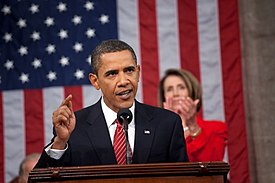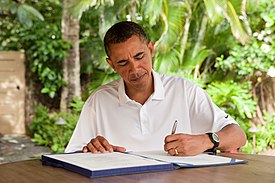
Back كونجرس امريكا ال111 ARZ 111. Kongress der Vereinigten Staaten German 111.º Congreso de los Estados Unidos Spanish 111e congrès des États-Unis French Kongres Amerika Serikat ke-111 ID 111º Congresso degli Stati Uniti d'America Italian アメリカ合衆国第111議会 Japanese 111e Amerikaans Congres Dutch 111. Kongres Stanów Zjednoczonych Polish 111.º Congresso dos Estados Unidos Portuguese
| 111th United States Congress | |
|---|---|
110th ← → 112th | |
 United States Capitol (2009) | |
January 3, 2009 – January 3, 2011 | |
| Members | 100 senators 435 representatives 6 non-voting delegates |
| Senate majority | Democratic |
| Senate President | Dick Cheney (R)[a] (until January 20, 2009) Joe Biden (D) (from January 20, 2009) |
| House majority | Democratic |
| House Speaker | Nancy Pelosi (D) |
| Sessions | |
| 1st: January 6, 2009 – December 24, 2009 2nd: January 5, 2010 – December 22, 2010 | |











The 111th United States Congress was a meeting of the legislative branch of the United States federal government from January 3, 2009, until January 3, 2011. It began during the last weeks of the George W. Bush administration, with the remainder spanning the first two years of Barack Obama's presidency. It was composed of the Senate and the House of Representatives. The apportionment of seats in the House was based on the 2000 U.S. census.[1][2][3]
In the November 2008 elections, the Democratic Party increased its majorities in both chambers (including – when factoring in the two Democratic caucusing independents – a brief filibuster-proof 60-40 supermajority in the Senate), and with Barack Obama being sworn in as president on January 20, 2009, this gave Democrats an overall federal government trifecta for the first time since the 103rd Congress in 1993.
However, the Senate supermajority only lasted for a period of 72 working days while the Senate was actually in session. A new delegate seat was created for the Northern Mariana Islands.[4] The 111th Congress had the most long-serving members in history: at the start of the 111th Congress, the average member of the House had served 10.3 years, while the average Senator had served 13.4 years.[5] The Democratic Party would not simultaneously control both the U.S. House of Representatives and the U.S. Senate again until more than a decade later, during the 117th Congress.
The 111th Congress was the most productive congress since the 89th Congress.[6] It enacted numerous significant pieces of legislation, including the Lilly Ledbetter Fair Pay Act, the American Recovery and Reinvestment Act, the Patient Protection and Affordable Care Act, the Dodd–Frank Wall Street Reform and Consumer Protection Act, and the New START treaty.
Cite error: There are <ref group=lower-alpha> tags or {{efn}} templates on this page, but the references will not show without a {{reflist|group=lower-alpha}} template or {{notelist}} template (see the help page).
- ^ H.Con.Res. 223
- ^ Pub. L. 111–121 (text) (PDF)
- ^ H.Con.Res. 336
- ^ Consolidated Natural Resources Act of 2008, Pub. L. 110–229 (text) (PDF)
- ^ Glassman, Matthew Eric; Wilhelm, Amber Hope. "Congressional Careers: Service Tenure and Patterns of Member Service, 1789-2015" (PDF). Federation of American Scientists. Congressional Research Service. Archived (PDF) from the original on February 19, 2015. Retrieved January 27, 2015.
- ^ "No Congress Since 1960s Has Impact on Public as 111th - Bloomberg Business". Bloomberg News. February 3, 2015. Archived from the original on February 3, 2015. Retrieved March 19, 2024.
© MMXXIII Rich X Search. We shall prevail. All rights reserved. Rich X Search